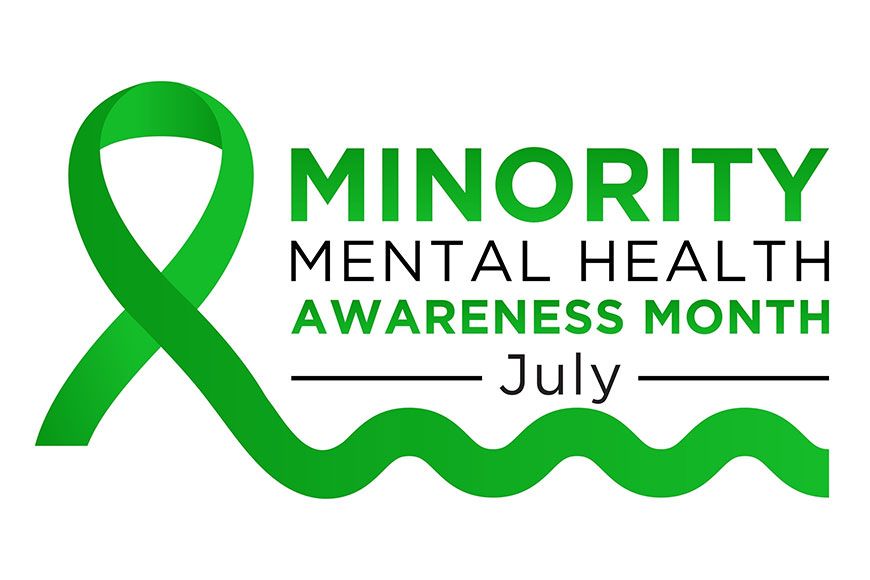By Rychel Johnson, M.S., LCPC, Licensed Clinical Professional Counselor
Updated on October 4, 2023
Published on July 7, 2023

Get latest news, updates, and trends on mental well-being

If you belong to a racial or ethnic minority group or indigenous population and are experiencing mental health challenges, you are not alone. Historically marginalized groups frequently encounter distinct stressors and disparities that impact their mental well-being.
Since 2008, National Minority Mental Health Awareness has been observed each July in the United States to shed light on the unique mental health challenges faced by minority communities1.
To foster a more inclusive society, we must promote mental health awareness among minority groups.
Overall, we live in a time with a decreased stigma around mental health concerns; however, barriers to mental health care for minorities still exist and are worthy of our attention.
Racial and ethnic minorities often face discrimination and bias, increasing stress, anxiety, and depression1. The cumulative effect of everyday microaggressions and overt racism can negatively impact mental health outcomes. Additionally, cultural stigma and mistrust of mental health services can deter individuals from seeking help, resulting in delayed or inadequate treatment.
Indigenous populations have historically endured the intergenerational effects of colonization, cultural erasure, and forced assimilation. This has resulted in high rates of mental health conditions, substance abuse, and suicide among indigenous communities. Healing and revitalizing cultural traditions and practices are crucial for promoting mental well-being within these groups.
Immigrants and refugees are another group of focus for Minority Mental Health Awareness. These individuals often experience significant stressors related to language barriers, social isolation, and trauma associated with leaving their loved ones who may still reside in their home country. Adapting to a new culture is a significant challenge when we consider how difficult it can be to find employment and housing.
National Minority Mental Health Awareness Month highlights the disproportionate mental health inequalities experienced by minority communities. These differences arise from various factors and include:
While many mental health treatment services, online therapy platforms, and medication providers exist in the United States, minority groups are not getting connected as often as others. Here’s why:
In many cases, these barriers result in individuals not receiving the mental health interventions they need. Additionally, they could likely receive a misdiagnosis and drop out of care due to providers’ biases that make pursuing ongoing care challenging.
It’s clear that the demographics of the U.S. population are not yet mirrored within the mental health provider workforce; however, new data suggests that the numbers of racial and ethnic minority mental health providers are increasing. From 2000 and 2009, the number of racial and ethnic minorities who provide psychiatric care more than doubled (from 7,140 to 18,986 individuals)6.
National Minority Mental Health Awareness Month aims to address these gaps in mental health care by promoting culturally competent mental health services. This movement involves raising awareness among healthcare providers, policymakers, and the public about the specific needs and challenges faced by minority communities.
Additionally, mental health professionals must recognize a need to deliver more appropriate and inclusive care by identifying and understanding the diverse cultural contexts and experiences that shape mental health for racial and ethnic minorities.
A critical first step in addressing the mental health awareness of minorities is gaining understanding of the discrepancy. Acknowledging barriers to mental health access and help-seeking behaviors is paramount to creating change.
Approaches for improving the outlook of mental health treatment for minorities could include:
While there are tangible ways to increase awareness and mental health initiatives for racial and ethnic minorities, significant work remains in changing the narrative for seeking mental health treatment through education, training, and continuing to destigmatize the mental health needs of minorities.
Addressing mental health disparities among racial and ethnic minorities requires a multi-faceted approach that includes policy changes, increased access to culturally competent care, community engagement, and education. It is essential to foster collaborations between mental health providers, community organizations, and minority leaders to develop targeted strategies that meet the unique needs of these communities.
By promoting awareness, challenging stigma, and expanding access to resources, National Minority Mental Health Awareness can empower individuals to seek intervention to support their mental wellness. Not every human can flourish until we can create a more equitable approach to pursuing mental health services.
National Minority Mental Health Awareness helps amplify voices and share experiences to increase understanding for the well-being of our diverse society. While Minority Mental Health Awareness Month is observed in July, minority mental health is important throughout the year, and efforts to address mental health disparities and promote mental health equity should be ongoing.